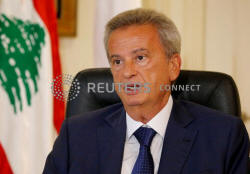Lebanon central bank says bank deposits are safe, banks
to review curbs
 Send a link to a friend
Send a link to a friend
 [November 11, 2019] By
Nadine Awadalla [November 11, 2019] By
Nadine Awadalla
BEIRUT (Reuters) - Lebanon's central bank
governor, seeking to shore up creaking confidence in the banking system
amid the worst economic crisis in decades, said on Monday bank deposits
are secure and it had the ability to preserve the stability of the
Lebanese pound peg.
In a televised news conference, the governor, Riad Salameh, said capital
controls were not on the table because Lebanon depended on free movement
of money, adding that the central bank had taken steps to safeguard
deposits and there would be no haircut.
Already in deep economic turmoil, Lebanon has been plunged deeper into
trouble since Oct. 17 when an unprecedented wave of protests against the
ruling elite erupted across the country and prompted the resignation of
Prime Minister Saad al-Hariri.
A big part of Lebanon's economic crisis stems from a slowdown of capital
inflows which has led to a scarcity of U.S. dollars and spawned a black
market where the Lebanese pound has weakened below its official pegged
rate.
Since reopening on Nov. 1 after a two-week closure, banks have been
seeking to stave off capital flight by blocking most transfers abroad
and imposing curbs on hard-currency withdrawals.

Referring to these restrictions, Salameh said the central bank had also
asked banks to review what he described as somewhat "conservative" steps
taken because of instability that was prevailing at the time banks had
reopened.
He said that banks managing their liquidity did "not mean the solvency
of the banking sector was reduced or poses dangers to deposits."
Salameh said the central bank was allowing banks to borrow dollars
without limits at 20 percent interest to secure depositors' needs on
condition such funds were not transferred abroad.
"The mechanism we put in place to protect the depositor is through
preventing any bank from failing," he said.
[to top of second column] |

Lebanon's Central Bank
Governor Riad Salameh speaks during an interview with Reuters in
Beirut, Lebanon August 6, 2018. REUTERS/Mohamed Azakir

STAGNANT LOCAL ECONOMY
Salameh said the central bank hoped for the formation of a new government as
soon as possible. The central bank would seek to bring down interest rates
through liquidity management measures, he added.
"We are today in a new phase," Salameh said. "We will preserve the stability of
the exchange rate of the pound, this stability is present," he said, noting that
banks were still dealing dollars at the official pegged rate.
The difference between the official rate and that on the parallel market was due
to "supply and demand", he said. The central bank would not go to exchange
dealers to give them dollars to preserve the official rate, he said.
This "phenonmeon" would retreat when there is more "relief" in the situation, he
said.
One dollar was buying 1,800 pounds or more on Friday compared to 1,740 on
Thursday, two market sources said. The pegged rate is 1,507.5 pounds. Banks on
Monday were closed for a holiday.
A stagnant local economy and a slowdown in cash injections from Lebanese abroad
have put pressure on the central bank's foreign currency reserves in recent
years. Recent months have seen the emergence of a parallel exchange market for
dollars.
The build-up of economic and political pressure has made dollars harder to come
by and weakened the pound against the dollar on the parallel exchange market
with a discount to the official two-decade old peg around 20%.
(Writing by Tom Perry/Ellen Francis; Editing by William Maclean)
[© 2019 Thomson Reuters. All rights
reserved.] Copyright 2019 Reuters. All rights reserved. This material may not be published,
broadcast, rewritten or redistributed.
Thompson Reuters is solely responsible for this content. |